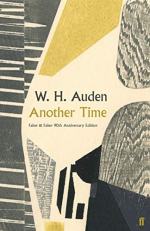|
This section contains 279 words (approx. 1 page at 400 words per page) |

|
September 1, 1939 Summary & Study Guide Description
September 1, 1939 Summary & Study Guide includes comprehensive information and analysis to help you understand the book. This study guide contains the following sections:
This detailed literature summary also contains Quotes and a Free Quiz on September 1, 1939 by W.H. Auden.
The following version of this poem was used to create this guide: Auden, W.H. “September 1, 1939.” Poets.org, https://poets.org/poem/september-1-1939.
Note that all parenthetical citations refer to the line number from which the quotation is taken.
The poems of W.H. Auden (1907-1973), a twentieth-century Anglo-American poet, represent the modernist tradition in many ways. The poet lived through both world wars, the rises of fascism and communism, mid-century decolonization, the first strains of the Cold War, and various other cultural moments, all of which informed his poetry: in his work, Auden frequently relies on a combination of the roles of lyricist, social critic, and political commentator. Young Wystan Hugh Auden grew up alongside a "modern" cohort encumbered with the anxieties of fin-de-siècle Europe and, like other Lost Generation poets, reached artistic maturity in a tumultuous, ever-changing atmosphere. His poetic oeuvre is notable chiefly for its philosophic breadth and diversity of styles and techniques, mirroring how a changing world demands variation in its artistic spheres.
“September 1, 1939,” one of Auden’s most widely read poems, translates the horrifying outbreak of World War II into an abstract, reflective tenor. It cautions against the widespread apathy of the 1930s while subtly arguing for improved moral and intellectual activity. Like W.B. Yeats's “Easter, 1916,” an impassioned reflection on the failed Irish uprising of the titular year, the poem provides a venue for its author to puzzle out his own understanding of a highly destructive world event. “September 1, 1939” enacts both a pedagogical agenda through its scathing critiques of society at the same time its intimate, first-person speaker suggests catharsis for the individual amidst a war-torn world.
Read more from the Study Guide
|
This section contains 279 words (approx. 1 page at 400 words per page) |

|



